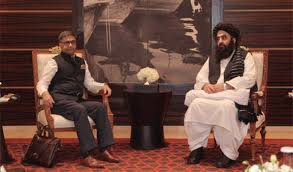NEW DELHI: Three years after the Taliban walked into Kabul without firing a shot, overhauling the great game in inner Asia, Foreign Secretary Vikram Misri met the acting Taliban foreign minister Amir Khan Muttaqi in Dubai today and put his seal on a brand new engagement between Delhi and Kabul.
“Both sides discussed India’s ongoing humanitarian assistance to Afghanistan, bilateral issues and security situation in the region. India reiterated its commitment to continue to provide humanitarian and development assistance to the Afghan people,” a statement by the Ministry of External Affairs said.
The Taliban statement on the meeting sought to reassure India. “The foreign minister (Muttaqi) assured the Indian side that there is no danger to anyone from Afghanistan and expressed the hope of increasing diplomatic relations and creating facilities related to visas for businessmen, patients and students,” it said.
The Misri-Muttaqi meeting is bound to shake up not just Pakistan, whose military establishment has always believed that it is the Taliban’s first and fast friend, but also the US and the remainder of the western world. The Americans fled Kabul days before August 15, 2021, without even turning the lights off at their Bagram base located within shouting distance of Kabul, and the rest of the western embassies — British, French, German followed suit.
Only the Russians and the Chinese stayed, the first steeled in the art of realpolitik, the second eager to spread their influence via the exploitation of virgin mineral belts, like copper. The Pakistanis moved in, then ISI chief Faiz Hamid strutting around Kabul, confident that Rawalpindi had written the last chapter on “strategic depth” in which Pakistanis would take charge of the vast Afghan territories and use it to crowd out India.
But relations between Kabul and Islamabad have deteriorated in recent days and months, with both sides accusing each other of carrying out terrorist incidents in the other’s country.
At least for the moment, India seems to have won this round. JP Singh, a middle-ranking diplomat in the MEA and in charge of the AfPak desk, took charge of the relationship going south in 2021 and seems to have painstakingly resurrected it. His visits to Kabul, Doha and Dubai, where he met a variety of Taliban leaders these last three years, has borne fruit today.
But JP Singh couldn’t have done it without the political decision taken right at the very top, by PM Modi, National Security Adviser Ajit Doval and External Affairs Minister S Jaishankar.
And that’s the significance of the Misri-Muttaqi meeting. The fact that democratic India and the women-hating Taliban regime are on the same page and that Pakistan is looking askance.
“The Afghan side underlined its sensitivities to India’s security concerns. The two sides agreed to remain in touch and continue regular contacts at various levels,” the MEA statement said, adding, “The Foreign Secretary underlined India’s historic friendship with the Afghan people and the strong people-to-people contacts between the two countries. In this context, he conveyed India’s readiness to respond to the urgent developmental needs of the Afghan people.”


